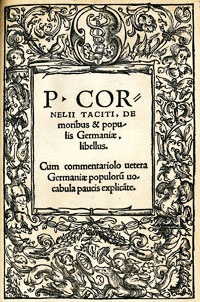Tacitus and the Batavians
The ancient Roman historian Publius Cornelius Tacitus (ca. 56 – 120 A.D.) composed arguably the most famous chronicles of historical events
and developments of his time. The Batavian myth has its origin almost exclusively in his writings. In one of his first works, Germania,
written around 98 A.D., Tacitus first discussed the Batavians, one of the feuding German tribes around the river Rhine:
Germania, 29:
“The most conspicuously brave of all the German tribes in Gaul, the Batavi, hold little of the river-bank, but do hold the Rhine island. They were
once a section of the Chatti, and on the occasion of a civil war they migrated to their present home – destined there to become a part of the Roman
empire. But they still retain an honourable privilege in token of their ancient alliance with us. They are not subjected to the indignity of tribute
or ground down by the tax-gatherer. Free from imposts and special levies, and reserved for employment in battle, they are like weapons and armour – ‘only
to be used in war’.”

>One of the first Renaissance editions of Tacitus' work (ca. 1519).
Elsewhere, most notably in Books IV and V of his Histories, completed around 115 A. D., Tacitus described that other canonical aspect
of the Batavian myth, the revolt of the ancient Batavians against their Roman allies in 69-70 A.D., inspired by their charismatic leader Claudius
Civilis:
Histories IV, 14:
“Civilis invited the [local] nobles and the most enterprising commoners to a sacred grove, ostensibly for a banquet. When he saw that darkness
and merriment had inflamed their hearts, he addressed them. Starting with a reference to the glory and renown of their nation, he went on to
catalogue the wrongs, the depredations and all the other woes of slavery. The alliance [with Rome], he said, was no longer observed on the old
terms: they were treated as chattels. How long would they have to wait for the arrival of the governor, who, despite his burdensome and overbearing
suite, did exercise real control? The Batavians were at the mercy of prefects and centurions who, when glutted with spoil and blood, were replaced
by others looking for fresh pockets to pick and new labels for plunder. They were faced with a levy which parted children from parents and brothers
from brothers, apparently for ever. The Roman state had never been in such low water. The permanent legionary camps contained nothing but loot
and old men past service. They had only to lift up their eyes. They should have no fear of the legions: these were merely names without substance.
The Batavians, on the other hand, could rely on a strong body of infantry and cavalry, kinship with the Germans and identity of purpose with
the Gallic provinces. Even the Romans would welcome such a war, in which a doubtful issue would at any rate secure the rebels credit with [Emperor]
Vespasian, and an outright victory call for no apology.”
As with so many classical texts, Tacitus’ historical writings were avidly read by contemporaries, and subsequently largely forgotten, until
the Renaissance saw a renewed interest in ancient Greek and Roman literature. Tacitus’ works reappeared in Rome in 1515, and in Basle in
1519, providing >humanists with fresh insights into classical times.
|



